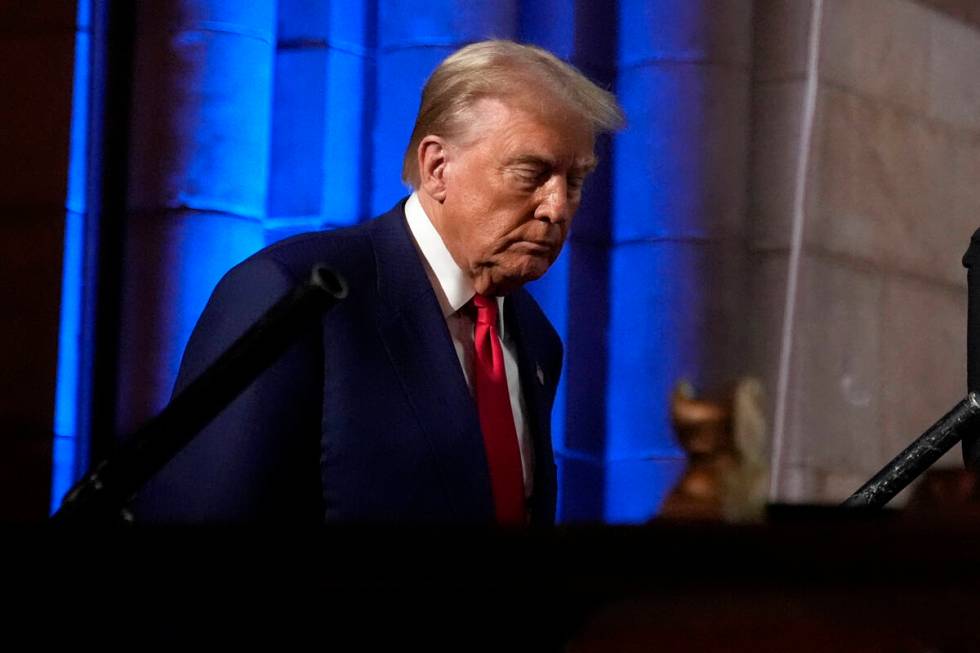Lawyers for Trump fight to overturn verdict in sex abuse suit

NEW YORK — Veering from the campaign trail to a courtroom, Donald Trump quietly observed Friday as one of his lawyers fought to overturn a verdict finding the former president liable for sexual abuse and defamation.
The Republican nominee and his accuser, E. Jean Carroll, a writer, sat at tables about 15 feet (4.5 meters) apart, in a federal appeals court. Trump didn’t acknowledge or look at Carroll as he passed directly in front of her on the way in and out, but he shook his head at points, such as when Carroll’s attorney said he sexually attacked her.
Trump attorney D. John Sauer told 2nd U.S. Circuit Court of Appeals judges that the civil trial in Carroll’s lawsuit was muddied by improper evidence.
“This case is a textbook example of implausible allegations being propped up by highly inflammatory, inadmissible” evidence, Sauer said, noting that the jury was allowed to consider such items as the infamous “Access Hollywood” tape in which Trump boasted years ago about grabbing women’s genitals.
Carroll’s lawyer, Roberta Kaplan, told the judges the evidence in question was proper, and that there was plenty of proof in the nearly two-week-long trial of Carroll’s claim that Trump attacked her in a luxury department store dressing room decades ago.
“E. Jean Carroll brought this case because Donald Trump sexually assaulted her in 1996, in a dressing room at Bergdorf Goodman, and then defamed her in 2022 by claiming that she was crazy and made the whole thing up,” Kaplan said.
Carroll, standing with Kaplan outside the courthouse afterward, declined to comment.
Trump left court in a motorcade, then delivered a lengthy diatribe against the case at Trump Tower, where he said again that Carroll — and other women who had accused him of sexual assault — were making everything up.
“It’s so false. It’s a made up, fabricated story by somebody, I think, initially, just looking to promote a book,” Trump said.
In his remarks to reporters Friday, Trump repeated many of the same claims about Carroll that a jury has already found to be defamatory, and added some new ones, like suggesting that a photograph of him and Carroll together in 1987 was actually produced by artificial intelligence. It was unclear whether his comments might open the door to a new defamation lawsuit by Carroll.
“I’ve said before and I’ll say it again: all options are on the table,” Kaplan said in a statement after Trump’s news conference.
The three-judge panel, if it follows the pattern of other appeals, would be unlikely to rule for weeks, if not months.
A jury found in May 2023 that Trump sexually abused Carroll. He denies it. That jury awarded Carroll $5 million.
Trump did not attend the trial and has expressed regret that he was not there.
The civil case has both political and financial implications for Trump.
Vice President Kamala Harris, the Democratic presidential nominee, has jabbed at Trump over the jury’s verdict, noting repeatedly that he had been found liable for sexual abuse.
And last January, a second jury awarded Carroll another $83.3 million in damages for comments Trump had made about her while he was president, finding that they were defamatory. That jury had been instructed by the judge that it had to accept the first jury’s finding that Trump had sexually assaulted Carroll.
Trump, 78, testified less than three minutes at the second trial and was not permitted to refute conclusions reached by the May 2023 jury. Still, he was animated in the courtroom throughout the two-week trial, and jurors could hear him grumbling about the case.
The appeal of that trial’s outcome will be heard by the appeals court at a later date.
Carroll, 80, testified during both trials that her life as an Elle magazine columnist was spoiled by Trump’s public comments, which she said ignited such hate against her that she received death threats and feared going outside the upstate New York cabin where she lives.
During Friday’s arguments, Trump’s attorney said testimony from witnesses who said Carroll told them about the 1996 encounter with Trump immediately afterward was improper because the witnesses had “egregious bias” against Trump.
Sauer also attacked the trial judge’s decision to let two other women testify about similar acts of sex abuse they say Trump committed against them in the 1970s and in 2005. He denies those allegations.
Trump’s lawyers have also argued that Kaplan wrongly disallowed evidence that Carroll lied during her deposition, and other evidence they say would reveal bias and motives to lie for Carroll and other witnesses against Trump. The verdict, they wrote, was “unjust and erroneous,” resulting from “flawed and prejudicial evidentiary rulings.”
The judge is no relation to Carroll’s attorney.
Trump has insisted that Carroll made up the story about being attacked to sell a new book. He has denied knowing her.
Trump’s lawyers also challenged the repeated airing at trial of the 2005 “Access Hollywood” videotape, in which Trump is heard saying that he sometimes just starts kissing beautiful women and “when you’re a star they let you do it.” He also said that a star can grab women’s genitals because “you can do anything.”
In their written arguments, Carroll’s lawyers said Trump was wrongly demanding “a do-over” based on unfounded “sweeping complaints of unfairness” and other “distortions of the record, misstatements or misapplications of the law, and a steadfast disregard of the district court’s reasoning.”
“There was no error here, let alone a violation of Trump’s substantial rights. This Court should affirm,” Carroll’s lawyers said.
The Associated Press does not identify people who say they have been sexually assaulted unless they come forward publicly, as Carroll has done.
Associated Press writer Jennifer Peltz contributed to this report.